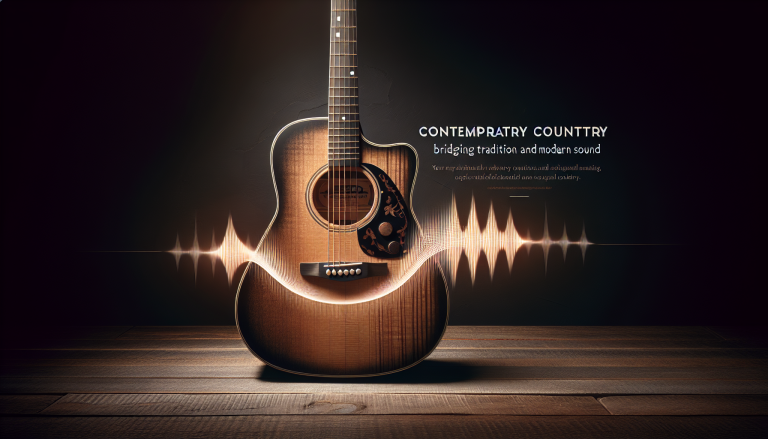The Roots and Rise of Contemporary Country
Contemporary country music holds a special place in the heart of American music, a genre that bridges the soulful storytelling of its traditional roots with the energy and polish of today’s soundscape. Emerging in the late 20th century, contemporary country has expanded the genre’s reach far beyond the honky-tonk bars and open fields of its birthplace, speaking to a new generation of listeners while honoring the past.
At its core, contemporary country music is both a continuation and a reinvention. It traces its origins to the mid-century legends of country music—the likes of Hank Williams, Patsy Cline, and Johnny Cash—whose raw and honest lyrics about love, loss, and life’s simple pleasures laid the foundation. However, as America entered the 1980s and ’90s, a wave of artists began blending traditional country instruments like the steel guitar and fiddle with pop, rock, and even R&B influences. This fusion created a sound that was at once unmistakably country but refreshingly modern.
The surge of contemporary country came at a time when American music was evolving rapidly. Urbanization and media expansion brought country music to new audiences, while the Nashville music scene became a crucible for artistic experimentation. Artists who grew up listening to the timeless legends decided to tell their own stories—infused with their experiences and contemporary sounds. This era was marked by the introduction of slicker production techniques and hooks that embraced mainstream appeal without sacrificing heartfelt storytelling.
Distinctive Sounds: What Makes Contemporary Country Unique?
Contemporary country music is defined by its seamless blend of classic country storytelling and modern musical elements. Unlike its more traditional counterpart, which often relied solely on acoustic instruments like the fiddle, banjo, and upright bass, contemporary country incorporates electric guitars, keyboards, and even drum machines. This blend creates a vibrant palette that appeals across age groups and backgrounds.

Yet, what remains unchanged is the genre’s deep commitment to lyrical narrative. The songs often explore themes of love, family, faith, and the bittersweet moments that make life unforgettable. Contemporary country singers are storytellers first—inviting listeners into their world with intimate confessions and universal emotions. The genre’s ability to balance upbeat anthems with tender ballads is part of what makes it endlessly captivating.
The production style leans toward a polished, radio-friendly sound, but there remains a profound respect for the authenticity that defines country music. This balance has allowed contemporary country to thrive in a music marketplace filled with genres vying for attention, ensuring its messages continue to resonate deeply.
Icons and Trailblazers of Contemporary Country
Few artists capture the essence and evolution of contemporary country music better than Garth Brooks. Emerging in the late 1980s, Brooks introduced a dynamic and electrifying performance style that merged the storytelling tradition with stadium-sized rock energy. His album *No Fences* (1990) remains a landmark, filled with tracks that became modern classics—“Friends in Low Places” being one of the most iconic.
Shania Twain’s influence cannot be overstated. Rising to stardom in the 1990s, she brought a dazzling mix of country and pop, empowered by infectious melodies and a bold, charismatic presence. Albums like *The Woman in Me* and *Come On Over* broke records and redefined the possibilities for women in country music, giving the genre a sparkling new dimension.
More recently, artists like Carrie Underwood, Keith Urban, and Kacey Musgraves have helped contemporary country maintain its relevancy. Underwood’s soaring vocals and powerful storytelling earned her crossover acclaim after her American Idol win, while Urban’s blend of guitar-driven melodies with heartfelt lyrics has enchanted fans worldwide. Meanwhile, Musgraves brings a fresh, poetic approach to songwriting, often touching on progressive themes while still grounded in country tradition.
Defining Songs and Albums: The Soundtracks of an Era
Several records stand out as milestones within contemporary country, each offering a snapshot of the genre’s ongoing transformation. For instance, Garth Brooks’ *No Fences* isn’t just an album—it’s a cultural moment that carried country music into the hearts and charts of a broader American audience. The unforgettable chorus of “Friends in Low Places” became an anthem for the working class, a rallying cry wrapped in humor and heartache.
Shania Twain’s *Come On Over* is another landmark, successfully marrying the storytelling depth of country music with the catchy hooks and rhythms of pop. Songs like “That Don’t Impress Me Much” and “You’re Still the One” showcased the genre’s capacity to be both deeply personal and broadly appealing.
In the 21st century, albums like Carrie Underwood’s *Some Hearts* and Kacey Musgraves’ *Golden Hour* have continued this tradition. Musgraves’ album, in particular, received critical acclaim for its lyrical vulnerability and sonic creativity, blending elements of country, pop, and even disco, illustrating how far contemporary country has stretched while staying true to its roots.
The Enduring Influence of Contemporary Country Music
The lasting effects of contemporary country music ripple throughout American music and culture, celebrating both heritage and progression. Its ability to embrace change without losing its soul highlights why contemporary country remains a vital voice in the broader American music landscape.
This genre has opened doors for diverse stories and artists, challenging stereotypes about what country music can be and who can perform it. It continues to tell the story of America in a way that feels immediate and relevant—whether it’s through heartache, hope, joy, or resilience.
Perhaps one of the most beautiful legacies of contemporary country is its affirmation that country music is not frozen in time. Instead, it is a living, breathing art form that evolves with every new voice but always holds on tightly to the power of storytelling—the true heartbeat of American music. Through every twang of a guitar string and every heartfelt lyric, contemporary country invites us into lives that are familiar yet endlessly surprising, making us feel seen, heard, and deeply connected.